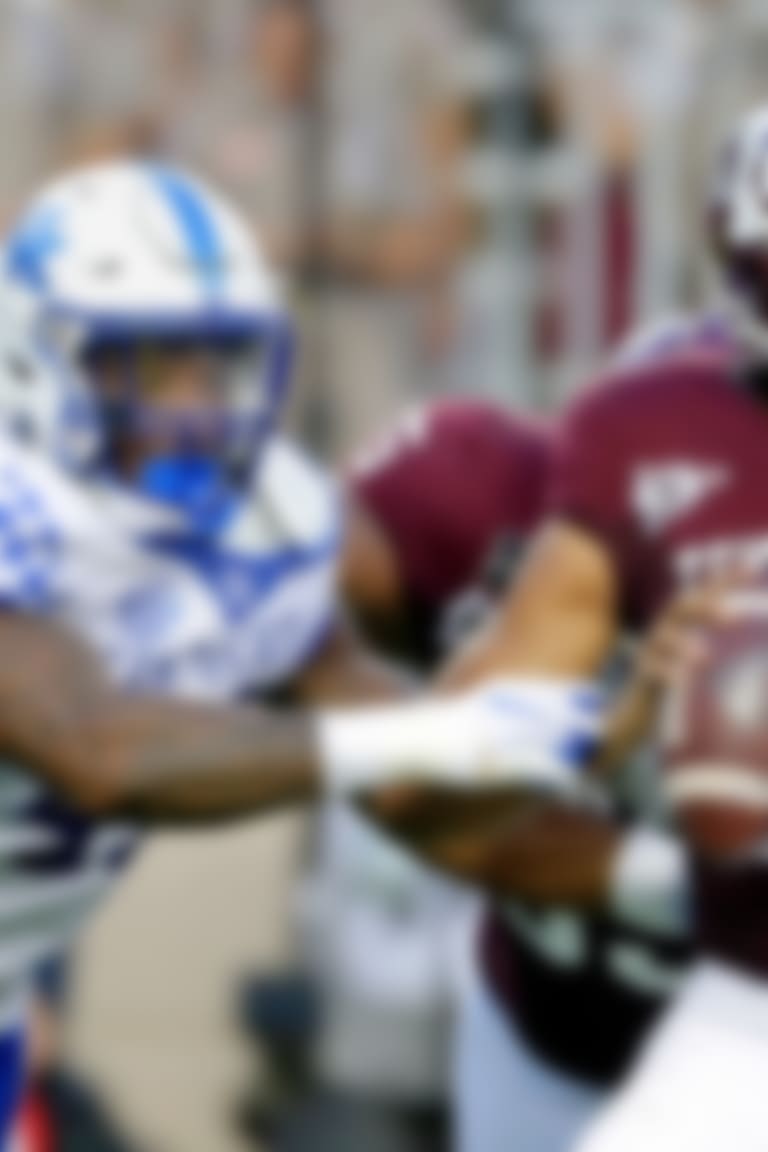How Kentucky pass rusher Josh Allen raised himself -- and a lowly SEC football program -- out of the basement to become one of this year's fast-rising prospects
By Chase Goodbread | Published Nov. 6, 2018
LEXINGTON, Ky. -- Several times a day, the buzz above Josh Allen's head would captivate his attention.
It started with the bell, then the footsteps, followed by laughter and the warbled sound of several simultaneous conversations. Then, just like that, it would disappear, like a two-minute cocktail party that could be heard overhead, but never seen. Students were switching classrooms between class periods at Rand Elementary in Montclair, N.J., and it was a painful reminder of Allen's segregated loneliness. From the basement of the school building, Allen longed to be amid that bustling burst of interaction.
It sounded like so much fun; at once a rush and a release, albeit a brief one, from the pressure of the school day. But for the small handful of kids placed in Rand's special education program, the basement -- cordoned off from the rest of the school population -- was where they spent the majority of their seven-hour school day.
Allen received an IEP (Individualized Education Program) for speech therapy, but eventually overcame it and assimilated into the regular classroom setting.
Overcoming, it turns out, has become his lifelong habit.
From the stutter that has now all but disappeared to an underlying case of ADHD which wasn't formally diagnosed until many years later, the Kentucky outside linebacker has made a routine of outperforming expectations. Nobody saw a future college player when he was a weak, skinny high school freshman who admits to being intimidated by the competition. Nobody saw a future high NFL draft pick when he was overlooked and dismissed as a two-star recruit who came within weeks of signing with an FCS school as his only scholarship offer.
And certainly, not after 40 years of Kentucky football futility -- in which the program averaged just two conference wins per season -- did anyone see a resurgence. But there was Kentucky last year, securing its first winning SEC season in four decades in a resurrection led by the least likeliest of candidates -- a hero around campus no longer hidden away from the rest of the student body.
Where he once recoiled from reading aloud in a classroom, fearful of his stutter being mocked, Allen now volunteers to speak to school children. Where he once went unseen from a school basement, he spent his last year at UK seeing his image promoted all over campus – and as far away as New York’s Times Square – as a face of the Wildcats program.
Success for first-round picks is all about meeting the highest of expectations. But as NFL clubs conduct their deep-dive research on Allen ahead of the draft, they'll discover a player whose arrival as an elite draft prospect hasn't been marked so much by meeting expectations when they're high.
For Allen, it's been more about raising them when they're low.
The children in the special ed program at Rand Elementary enjoyed brief moments each day outside the basement -- lunch, recess and, of course, after-school activities like sports -- but isolation was rough on self-esteem. Although Jason Simon was 2 years older than Allen, he remained in special ed classes for a year after his classmate returned to the school's regular population.
"That was a motivator for me," said Simon, now a linebacker at Monroe College in New York. "Nobody wanted to be down there, because everyone knew what that basement was for. When Josh went into regular classes, that showed me you could get out of the basement, that you didn't always have to be in a special class."
Still close friends today, they both look back on those classes positively from an educational standpoint. A lot of creative learning went on, and it came at the individualized pace that special education strives to provide.
"They would try to get me all the way through the alphabet, just saying letters, without a stutter," Allen said. "We would play speech games, too. I worked hard at it, and it was the best thing for me."
Problems were overcome.
Strides were made.
Triumphs happened.
But basement isolation created a social divide in the student body that persisted even after Allen returned to a regular classroom. At best, Allen said, the perception was that he was different. At worst, it was that he was inferior.
"You were just looked at differently," Allen said. "Some kids would shut down socially. I saw it happen a couple times."
It's an aspect of special education that challenges schools to be as inclusive as possible for students with special needs, while still recognizing the reality that mainstreaming them in a regular class setting might not be the proper or most effective way to educate them.
Allen's feelings about being separated largely mirror what his mother, Kim, felt when she first saw her son's classroom environment. She and the school agreed he needed specialized help and she knew he was receiving it, but she wasn't initially aware that he would be separated. Her assumption, instead, was that a teaching assistant would be helping her son in regular classes. Complicating the situation was that Josh's fraternal twin, Isaiah, who also stuttered but had less of a problem than his brother, had not been placed in special education.
"I didn't like that situation," Kim said. "I didn't think twins should be separated like that. I realized I needed to be more active in the PTA, more active with my child."
The youngest age at which Allen can recall being teased for his stuttering is in the first grade. The insults weren't clever or sophisticated, but kids reacted to it in perhaps the only way kids at such a young age know how: they parroted.
"If he would say something and stutter, kids would repeat what he said right back to him with a stutter," Simon said. "He didn't want them to show them that it hurt him. But I knew. I could see from his facial expression. His mood would change, because any other time, he was always smiling."
Allen's mother found that he would often get overly anxious to get his point across in a conversation. He especially had trouble with words that began with "s" and "sh", and when he slowed his thought process and relaxed, she said, his speech was fine. At school, however, he didn't like reading out loud in front of other kids when asked to by a teacher. Humor served as his defense mechanism with other children; his demeanor was kind, but his self-image was fragile.
"Plus, I was ugly," Allen said. "So, I got clowned on a lot. But I decided if people were going to clown me, I would clown them right back. So, I was always joking. I wasn't going to fight them. I was just going to give it back to them -- that's how I fought it."
Sitting at a conference table in Kentucky's Joe Craft Football Training Facility, Allen delves into an entirely different layer of his developmental challenge, one that took far longer to beat because it took far longer to recognize. But first, he demonstrates with each of five objects within immediate reach -- a water bottle, a cell phone, a pen, a notebook and a laptop -- and quickly touches each with alternating hands.
"I was always touching stuff, playing with stuff, fidgeting with my hands," Allen said. "If I didn't have schoolwork in front of me, I couldn't sit still. Deep down, I thought I might have ADHD."
His informal diagnosis was correct, but it wouldn't be confirmed until Kentucky had him tested as a freshman in 2015.
By the time Allen entered the sixth grade at Mount Hebron Middle School, now known as Buzz Aldrin Middle School (the famous astronaut is from there), his speech had vastly improved and he was well-liked among classmates. Jenn Kosuda assisted kids with special needs as a second teacher in a regular classroom environment -- exactly the setting Kim Allen had wanted for her son at Rand -- with an emphasis on organizational skills and study skills. Kosuda remembers Allen flourishing.
"She was a pivotal part of my life around that time," Allen said.
Still, he was a ball of energy who had trouble staying on task. His uncle, Gregory Hines, was a security officer at Mount Hebron -- he had transferred in from another school just as Allen entered the sixth grade -- and helped keep an eye on his nephew. ADHD made schoolwork difficult for Allen even into high school, but unlike a stutter that could be easily identified and monitored, ADHD can cloak itself in presumptions that its sufferers merely need to outgrow a youthful hyperactive nature. It did so with Allen.
"It was a team effort to stay on top of him. It was pretty bad at that time," Hines said. "If I caught him running the halls, I would put a stop to it. But he had the resources and support of family and teachers, and he could do the schoolwork. He was a smart kid. He couldn't always keep his mind on the work, but he could do the work. He proved that."
Montclair High offensive line coach Eugene Kline recalls a road trip for a game against St. Mark's High School in Wilmington, Del., sitting one row in front of Allen on a two-and-a-half-hour bus ride home.
"He did not shut up from the minute his butt hit the seat until we got all the way back to Montclair," Kline said with a laugh. "It's late at night, we'd just played a game. He's sitting behind me the entire ride. I turned around and said, 'Josh, you've got to be tired, bro. Take a nap.' "
Following his formal ADHD diagnosis at UK, Allen received an Adderall prescription that finally helped his concentration issues subside. These days, he only takes one if he needs a long period of concentration while studying for an important exam.














